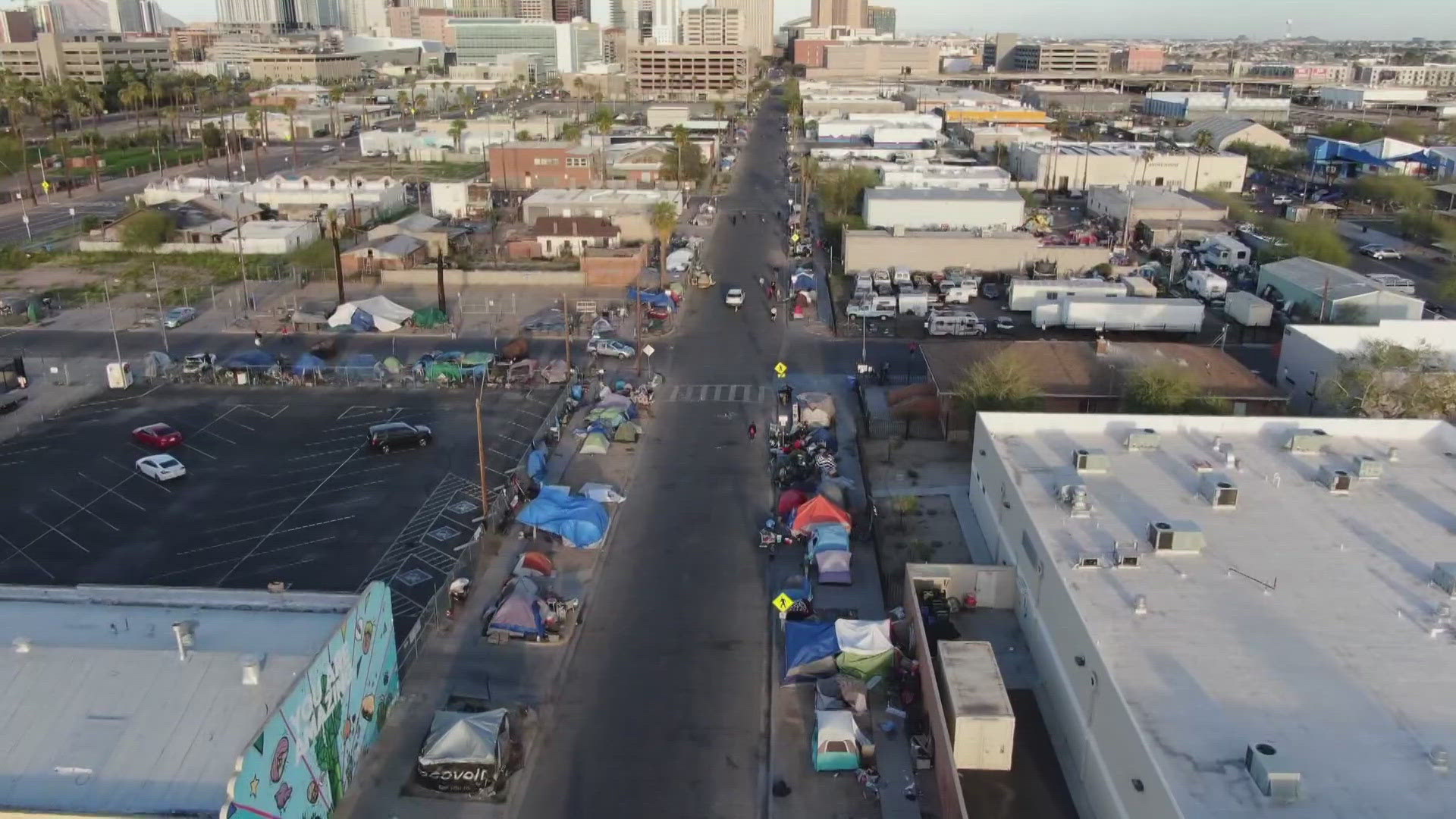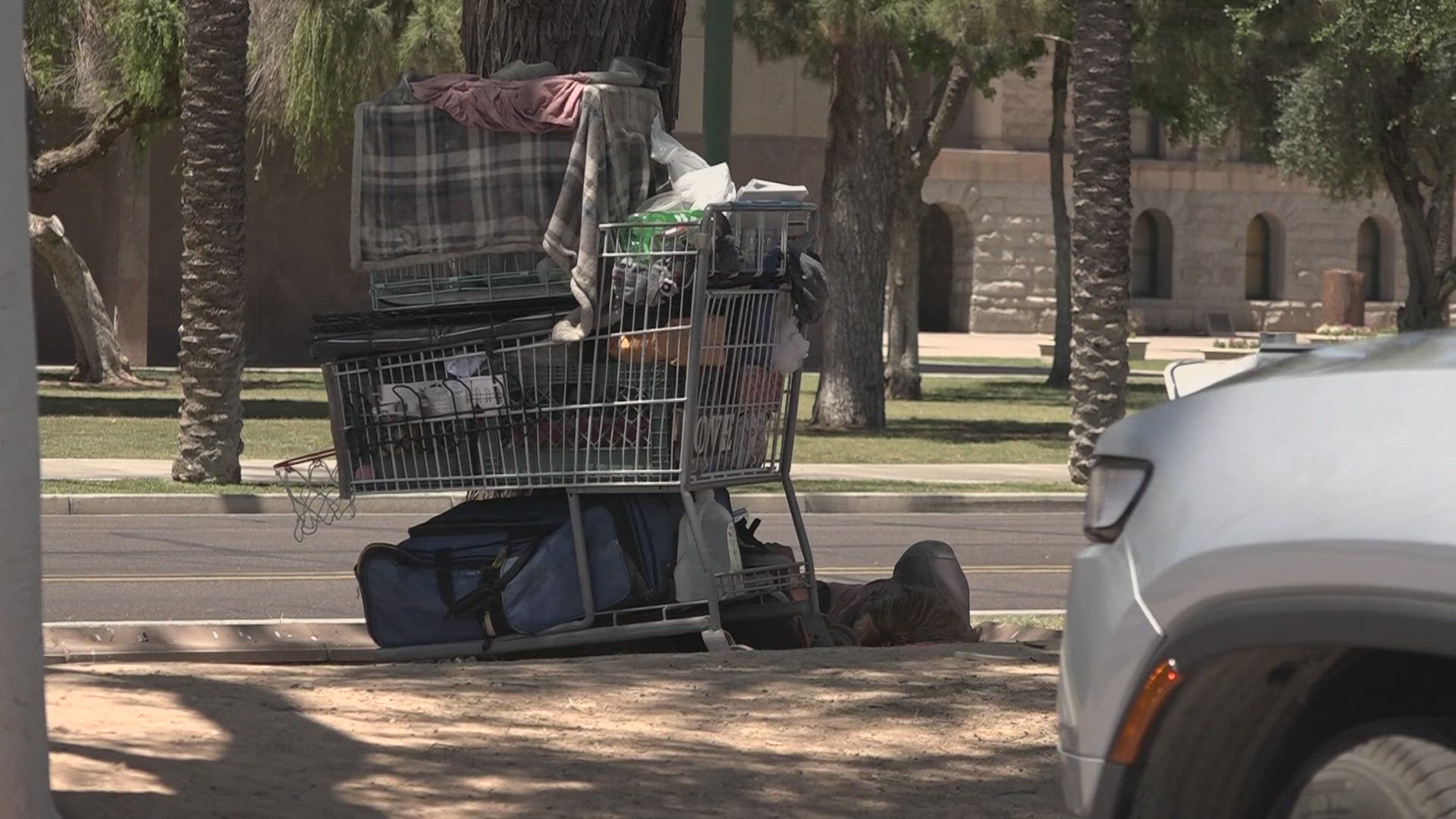PHOENIX — State Representative Matt Gress was on the phone discussing new legislation to address homelessness with a fellow lawmaker when he stopped in his tracks.
A few blocks over from the Capitol, near 19th Avenue and Van Buren Street, he saw an unconscious man.
"I saw this young man face down with a backpack," Gress said. "We've seen our share of people who are homeless walking around the Capitol, but I've never come across someone who I thought was dead."
Gress said he called 911 and that first responders arrived within minutes. Phoenix Fire confirmed they responded and took the man to the hospital.
"Once the firefighters came and administered Narcan, it became clear to me what had happened," Gress said. "That man's clock is ticking. I might not be there the next time he's experiencing an overdose and he could die. "
This scary situation is one of many that fueled the first-term lawmaker's will to push his colleagues in the legislature to make some changes.
"We really need to reset the conversation when it comes to helping people in the streets," Gress said.
Drafting a plan to address homelessness
From losing a job to rent rising. From sky-high healthcare to a lack of housing to addiction -- there are so many paths leading to homelessness, but there’s not a clear or easy path out.
In the two years the 12News I-Team has covered Arizona's homeless crisis, we've reported on many stakeholders trying to help the rising needs. Solutions are not one size fits all and no one agrees on what to do next.
Last year, lawmakers approved $60 million for a new Homeless Shelter and Services fund, which falls under the state’s Department of Housing. That funding has already been divided up into grants for some providers.
Lawmakers want to do more.
"Do you think the money that's being used for homeless services now is being wasted?" asked I-Team reporter Erica Stapleton.
"I think that it is doing a certain amount of good," Gress said. "My concern, however, is that a tiny fraction of what's being spent on homelessness is actually going toward treatment…and it's a never-ending cycle."
In this session, Gress introduced legislation that, in part, focuses on treatment.
He wants to make shelters drug-free zones with harsher penalties for those who are providing drugs inside.
"We’re not trying to criminalize people that are homeless," he said during a committee hearing where the bill was discussed. "We’re trying to help them."
He’s also calling on the state to fund an audit on how much is being spent and requiring providers to report metrics like overdoses and how long someone stays in housing.
Gress also laid out new regulations for shelter signage and hotels being used as shelter spaces in earlier versions of the bill.
"We have to see results," he said. "We have to know which interventions are working and which are not in order for us as state policymakers and local leaders to do the right thing."
His proposed changes have been welcomed by some, including other Republican lawmakers, policy groups and QuikTrip, who claim the homelessness crisis has created safety and security issues for their gas stations.
But not everyone is on board. Many Democratic lawmakers spoke out against the bill when it was first proposed in the House.
"This bill is a train wreck," said Representative Oscar De Los Santos during a committee hearing.
"It doesn’t provide real solutions," added Representative Judy Schwiebert.
The disagreement
The debate is complicated, but it boils down to some lawmakers wanting to focus on housing and others wanting to prioritize treatment.
"We're shooting ourselves in the foot if we just say, 'Oh, let's put them all in jail," Schwiebert said in an interview with 12News.
She has voted down Gress's bill each time it has come up on the floor and in hearings.
"Not everybody who is homeless has a substance abuse issue or a mental health issue," Schwiebert said.
Schwiebert wants to see a multi-pronged approach and hopes to invest in aid like eviction prevention, affordable housing and emergency funding.
"There's no one silver bullet to solving the homelessness issue," Schwiebert added.
She also pointed out issues with tracking metrics and creating more work for providers that are already overwhelmed.
"They're going to have to just do double the paperwork and the red tape on that," she said.
The I-Team learned that the Arizona Department of Housing does track the $60 million in the new homeless services fund. It requires providers who get the funding to submit progress reports, which the I-Team was able to review.
But because the funding was recently distributed, some of the providers are just getting going on their projects and the progress reports don't have a lot of detail.
Plus, not all providers receive state funding. Funding could come from federal or private sources.
The bottom line is that there’s not one collective overview that measures what all resources statewide are doing and spending.
"There's a systems piece missing, in my opinion," said Amy Schwabenlender, CEO of Keys to Change, formerly the Human Services Campus. "I would say, how does all of this add up and where's the investment coming from? But let's sit together and let's solve for it together."
The Key Campus, under the Keys to Change umbrella, is a one-stop shop for homeless services, including hundreds of shelter beds that are perpetually full.
She’s one of many providers, including other non-profits and cities like Mesa and Phoenix, who have voiced concerns with Gress’s bill.
Schwabenlender spoke out during committee hearings about challenges with enforcing parts of the proposed law on her campus.
"It sets us up that our employees would potentially be charged with a misdemeanor, $2,000 in fines...and really doesn't recognize that we have our own policies that if our employees are using drugs," she said. "If they're working with clients and allowing them to use drugs, we terminate them. So we have a policy."
She added that it would be challenging to track people who come to the campus for help after they've left.
"We can't track them for three years," she added. "And they have no obligation to tell us what they're doing with their life at any amount of time after they leave our services."
A problem is still a problem however it becomes a problem
Schwabenlender said her organization wasn't initially part of stakeholder meetings for the legislation but has since been invited to participate.
"For me - lawmakers, policymakers, I'd like for them to spend more time with the people doing the work," Schwabenlender said, referring to lawmakers and policymakers. "Maybe ask us what could we be doing differently? What would make programs more effective? And sometimes that's more money, sometimes it could be an administrative change. We haven't really been asked what we need to improve our outcomes."
In her experience, she said a treatment-first approach isn't evidence-based or considered a best practice in the field. And what she says they’re doing can be misunderstood.
"I think what happens is that housing-first gets cut off to be housing-only," she said. "And that's not the definition of it. It is about meeting people where they're at."
Maricopa County data shows that in 2023, there were 19 new people experiencing homelessness for every 10 people to find housing. The same report showed that 30,000 people were served through street outreach, emergency shelter, and transitional housing that same year.
The number of homeless families and seniors continues rising and shelters for these vulnerable populations can be limited.
Another analysis by the Phoenix Rescue Mission showed that nearly two-thirds of people they surveyed reported using drugs and that lacking basic needs and employment challenges were the hardest for people to overcome.
"Spending time on a debate between treatment-first and housing-first doesn't accomplish anything," Schwabenlender said. "And what we really need be talking about is how do we prevent more people from losing their homes falling into homelessness?"
Other lawmakers have introduced bills this session that focus on creating more housing and better care for those with serious mental illnesses. Gress's House bill did narrowly pass to the Senate, where it's still waiting. Key parts of his bill are also now a Senate bill that's still being debated.
The conversation is prompting promises from lawmakers to work across the aisle.
"We have to balance both sides here," Gress said in an April hearing. "But what we can’t do is continue to kick the can down the road."
Time will tell if they reach a middle ground this session, as more and more people become homeless... whatever the reason may be.
Up to Speed
Catch up on the latest news and stories on the 12News YouTube channel. Subscribe today.


